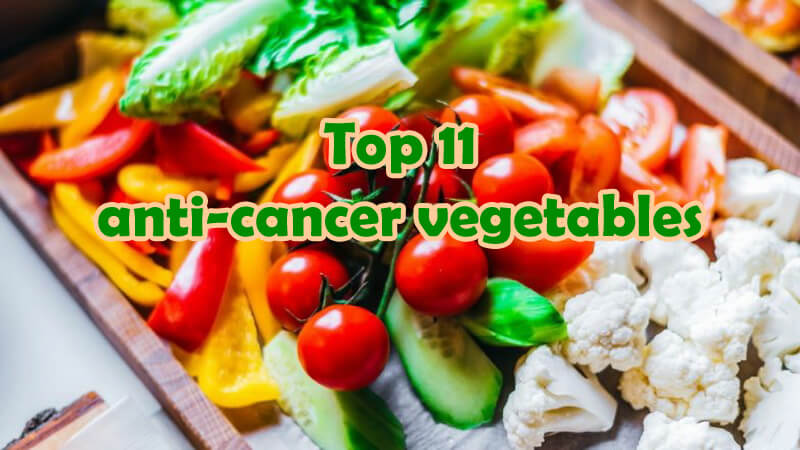Top 11 anti-cancer vegetables you need to know
Anti-cancer foods are those that have a specific effect on cancer prevention. These foods are high in antioxidants, proteins, zinc, vitamins, and other minerals that boost immunity and help prevent cancer. Are you aware of the foods that have anti-cancer and cancer-fighting properties? This article includes the top ten most powerful anti-cancer foods, which include pumpkin, garlic, carrots, tomatoes, corn, hawthorn, cauliflower, bell peppers, celery, apples, and blueberries. We hope you find this information useful.

1. Pumpkin
Pumpkin includes a variety of critical amino acids that the human body need, including high quantities of lysine, leucine, isoleucine, phenylalanine, and threonine. Furthermore, the genotype of the ascorbate peroxidase gene in pumpkin is identical to that found in tobacco, but its activity is significantly higher, indicating that pumpkin has a higher concentration of immune-active proteins. Pumpkin eating can counteract the mutagenic effects of carcinogenic nitrosamines, displaying cancer-prevention efficiency and assisting in the repair of liver and kidney functions.
2. Garlic
Garlic includes components such as germanium and selenium, which prevent tumor and cancer cell proliferation. The National Cancer Institute of the United States considers garlic to be the most powerful cancer-fighting plant on the planet.
3. Carrot
Carrot is a popular vegetable recognized for its crisp texture, delectable taste, and high nutritional value. Carrots are a nutritional powerhouse, high in sugars, lipids, volatile oils, carotenes, vitamin A, vitamin B1, vitamin B2, anthocyanins, calcium, iron, and other nutrients. Vitamin A helps to improve the body's immunological function and is essential in the prevention of epithelial cell carcinogenesis. Furthermore, the lignin in carrots can boost the body's immunological processes, so indirectly assisting in the eradication of cancer cells.
4. Tomato
The primary nutrition present in tomatoes is around vitamins, with lycopene, a form of carotenoid, being one of the most significant and abundant. Scientists have made tremendous advances in their study of the health advantages of lycopene. Proven benefits include unique antioxidant properties capable of neutralizing free radicals within the body that lead to aging and disease. It helps to prevent cardiovascular disease and slows the course of prostate cancer, lowering the risk of several malignancies including pancreatic, colorectal, laryngeal, oral, and breast cancer. Modern medical research reveals that cancer patients require much more vitamin C, and tomatoes, which are high in vitamin C, are an excellent choice for cancer prevention and resistance.
5. Corn
Corn is high in protein, fat, vitamins, trace elements, fiber, and other nutrients. It has enormous potential for the development of extremely nutritious, biologically functional foods. Corn, according to nutritionists both at home and abroad, includes glutathione, which has anti-cancer qualities. It has the ability to bond with numerous carcinogens in the body, rendering them non-carcinogenic. Corn fiber is a form of carbohydrate that the body does not absorb, lowering the concentration of carcinogens in the intestines and the accumulation of harmful compounds in the gut, lowering the risk of colon and rectal cancers. The lignin in maize can increase the activity of macrophages in the body by 2-3 times, preventing tumor formation. Corn is also high in minerals, with magnesium having anti-cancer properties.
6. Hawthorn
Hawthorn fruits can be eaten fresh or used to produce jams and pastes. They have qualities that reduce blood lipid levels, blood pressure, and irregular cardiac rhythms. Hawthorn is useful in treating chest and abdominal fullness, hernia, blood stasis, and irregular menstruation. Hawthorn flavonoids, notably quercetin, have powerful anti-cancer properties. Hawthorn extracts have been demonstrated to prevent cancer cell growth, proliferation, and invasive metastasis within the body.
7. Broccoli
Broccoli is a nutrient-dense vegetable high in protein, trace minerals, and carotenoids. It is a nutritious delicacy with anti-cancer and preventative effects. Broccoli has a wide range of vitamins, fibers, carotenoids, and trace element selenium, all of which contribute considerably to cancer prevention and anti-cancer properties. Notably, broccoli has more vitamin C, which, combined with its protein and carotenoid content, improves cellular immunological function.
8. Bell peppers
Bell peppers are excellent for raw intake since they are abundant in vitamin C and carotenoids, which work as powerful antioxidants. They are resistant to cataracts, heart disease, and cancer. Bell peppers' deeper red color indicates better nutritional content, with vitamin C concentration exceeding that of many citrus fruits, making them particularly ideal for raw eating. Bell peppers have anti-cancer, cholesterol-lowering, and weight-management characteristics as well.
9. Celery
Celery contains a high concentration of proteins, carbohydrates, carotenoids, B-complex vitamins, calcium, phosphorus, iron, sodium, and other nutrients. It can suppress the generation of carcinogens by bacteria in the intestines at high quantities. Furthermore, it shortens the transit period of feces in the intestines, reducing carcinogen interaction with the colon mucosa and thereby serving the objective of avoiding colon cancer.
10. Apple
Apples are high in nutrients and vitamins, making them a popular fruit. They have a low calorie content, with 60 kilocalories per 100 grams. Apples include nutritious components that are highly soluble and easily absorbed by the human body. Apples can help prevent lung cancer and lead exposure, and the original anthocyanins can help prevent colon cancer.
11. Blueberries
Blueberries, which are little berries with a stunning blue color and delicate flesh, are high in nutrients. They have qualities that prevent brain and nerve aging, protect vision, strengthen the heart, have anti-cancer effects, soften blood vessels, and boost the immune system. Blueberries have an impressive nutritional profile. Blueberries' anthocyanins can prevent tumor cell proliferation, and taking half a cup daily can provide anti-cancer benefits.